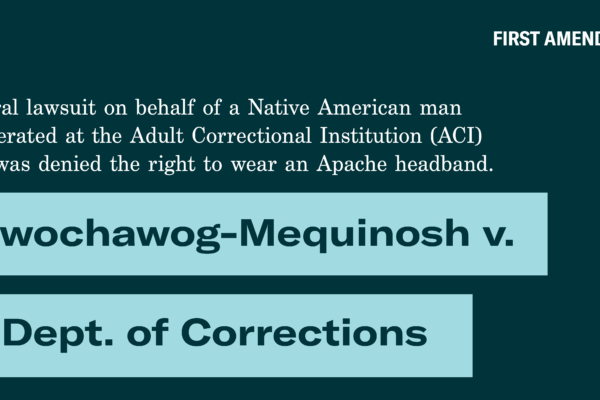Just weeks after the ACLU of Rhode Island and the RWU Law Prisoners’ Rights Clinic announced the favorable settlement of a lawsuit that challenged the R.I. Department of Corrections’ (RIDOC) refusal to accommodate the religious practices of a Native American prisoner to wear a religious headband, the two groups have filed a similar but broader suit on behalf of three other Native Americans at the ACI.
The lawsuit, filed by Jared Goldstein, Director of the RWU Law Prisoners’ Rights Clinic, and ACLU of RI cooperating attorney Lynette Labinger, argues that RIDOC has refused to accommodate an array of religious practices that Native Americans are routinely allowed to practice in federal and state prisons across the country. They include the right to hold communal prayer services and other religious ceremonies, to have access to a Native American elder to provide religious guidance, and the ability to obtain religious items that express their religious traditions, including medicine bags and dreamcatchers.
All three of the plaintiffs – Tyler Smith, Kyle Moreino, and Joseph Shepard – are of Native American ancestry and adherents to Native American religious traditions. The lawsuit documents their numerous unsuccessful efforts to get RIDOC to accommodate their religious beliefs. As the suit succinctly lays out the issue:
[P]rison systems around the country have adopted comprehensive policies for accommodating the religious practices of Native Americans, under which incarcerated individuals have access to a spiritual counselor, typically a Native elder; the opportunity to participate in religious ceremonies, including pipe ceremonies, sweat lodge ceremonies, smudging ceremonies, drum circles, and powwows; and the opportunity to obtain religious items, including medicine bags, feathers, and dream catchers.
In contrast, RIDOC has adopted no policies for accommodating Native American religious practices. It has created no opportunities for Native American prisoners to receive spiritual guidance from a Native American elder. It does not allow incarcerated people to participate in any Native American religious ceremonies. It does not allow Native American prisoners to obtain Native American religious items.
This is not a new problem. For years, Native American prisoners have complained about the absence of any religious accommodations at the ACI, but RIDOC has ignored those concerns.
The suit was brought under the Religious Land Use and Institutionalized Persons Act, a federal law that bars states from imposing any substantial burden on a prisoner’s exercise of religion unless it furthers a compelling interest and is the least restrictive means available. The suit seeks a court order requiring RIDOC to accommodate the prisoners’ religious beliefs that have been denied them as laid out in the complaint.
In the lawsuit involving another Native American prisoner that was settled last month, RIDOC had initially refused to allow Wolf Pawochawog-Mequinosh to wear an Apache headband, even as it allowed Muslim and Jewish prisoners to wear kufis and yarmulkes. In response to that suit, RIDOC relented and allowed him to obtain and wear the desired headband, but they did not agree to any similar accommodations for other prisoners.
Attorney Goldstein said today: “We call on the Department of Corrections to fulfill their obligation to accommodate the religious needs of Native Americans imprisoned at the ACI, who for years have been denied all opportunities to observe their religious traditions.”
ACLU of RI cooperating attorney Lynette Labinger added: “We have brought suit once again to ensure that incarcerated persons who follow religious traditions of Native Americans are able to practice their religion behind bars and that their efforts to do so are not ignored or disrespected. Federal law and the First Amendment require that even in prison, the custodians do not get to dictate what is an accepted religion and how it should be practiced.”
A copy of the complaint can be found here.


